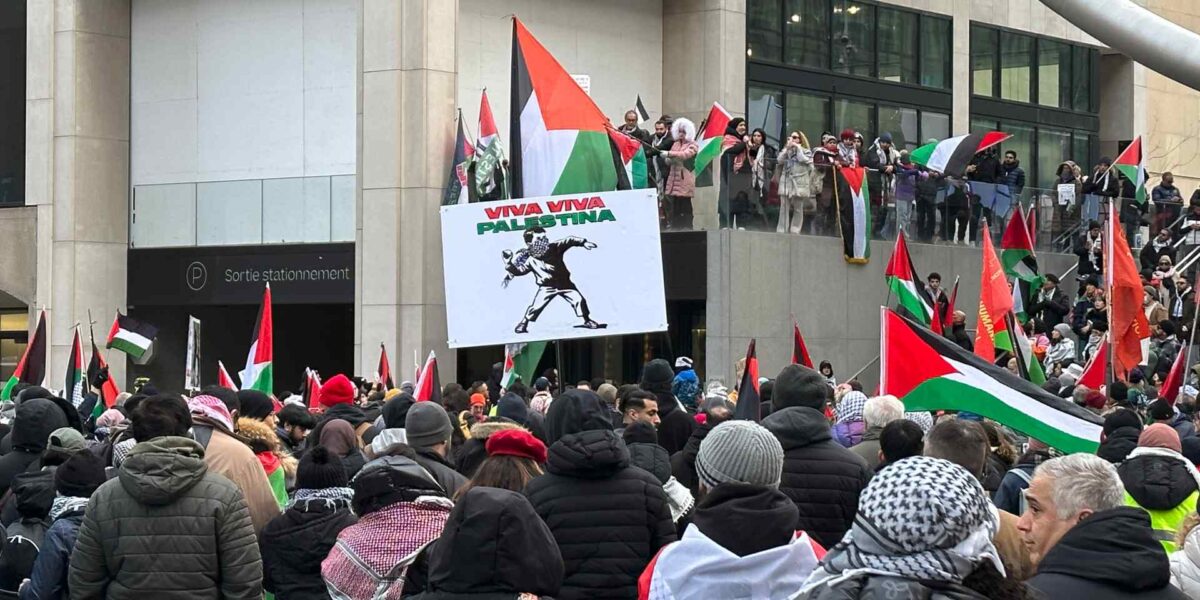As the war between Israel and Hamas continues, protests of all shapes and sizes have erupted across Canada in support of Palestine, calling for an immediate ceasefire to the siege on Gaza and for clean drinking water, power, and food to be allowed back into the strip.
University campuses are no exception, and they too have been flooded by students voicing their support for Palestine. Several student unions have officially adopted pro-Palestine stances because of the outpouring of support from students. University administrations, on the other hand, along with some politicians and groups such as B’nai Brith Canada, have made it clear that they do not agree with the decisions of several pro-Palestine student unions.
In at least four cases—at McGill University, the University of Ottawa, York University, and the University of Toronto: Mississauga—student unions have been condemned for publishing pro-Palestine statements, attempting to implement policies related to the Palestinian cause, and for other Palestine-centred activities such as fundraising. Students at the universities, including student union leaders, have told rabble.ca that they are witnessing dangerous, but not new, interventions in student democracy that threaten students’ rights to decide how their unions will represent them.
The cases described below at McGill and York are extreme examples of what can happen when university administrators and students disagree. But according to Ashley D’Souza, President of the York Federation of Students (YFS), the pattern of interference stems from the fact that students are change-makers.
“Students have always been at the forefront of change,” D’Souza said in an interview with rabble.ca. “We are huge, we are loud, and we have the power to make change, whether that is on our campus or in the world. I think folks are starting to see that and that is the part that is scaring our universities and our governments.”
Events at McGill
Over the past two months, students have been organizing on campus to protest the university’s ties to Israel, which include partnerships with Tel Aviv University, several research institutions, and investments in companies such as Lockheed Martin.
Many of the pro-Palestine events were coordinated by Solidarity for Palestinian Human Rights (SPHR) McGill, who also proposed a referendum question for the Fall 2023 Students’ Society of McGill University (SSMU) referendum entitled “Policy Against Genocide in Palestine.” If the policy received enough support through the referendum, the SSMU would have been mandated to advocate for the end of all Mcgill’s ties to Israel.
On November 20, 78.7 per cent of voters—a record 35 per cent of those eligible to vote participated in the referendum—approved the policy. The following day, a judge from the Superior Court of Quebec issued an injunction to the SSMU based on a lawsuit filed by B’nai Brith Canada that aims to permanently halt the adoption of the Policy Against Genocide in Palestine.
The McGill administration has also set its sights on SPHR McGill: Statements posted by the student group, which have since been deleted, were called out by the administration for “celebrating violence” and have since been cited as the reason SPHR will no longer be permitted to use the McGill name.
The SSMU declined rabble.ca’s request for comment due to the ongoing lawsuit with B’nai Brith. In previous statements however, the SSMU Board of Directors confirmed that the union and its lawyers “will vigorously contest the injunction.”
A McGill media relations statement to rabble.ca asserted that the university is committed to creating a safe environment for all students.
“Our efforts at McGill in relation to the crisis in Gaza and Israel are focused on maintaining a peaceful and inclusive environment for learning and work for all students, faculty, and staff. We are particularly concerned with addressing the needs of those who feel most vulnerable at this time, namely colleagues and students who are of Muslim, Jewish, and Arab identity,” read the email to rabble.ca.
The next court date regarding SPHR’s Policy Against Genocide in Palestine is scheduled for March 25, 2024. Until then, the debated policy cannot be ratified by the SSMU.
Events at York
Only a few days after the events of October 7, three unions at York University—the YFS, York University Graduate Students’ Association, and Glendon College Student Union—published a joint “Statement of solidarity with Palestine.” In the statement, the unions acknowledged that “since 1948, Palestinian people have been systemically displaced from their land and homes as a result of state-sanctioned violence, siege, and genocide.”
A week later, on October 20, the York administration condemned the student unions for creating “serious and ongoing harms.” The administration also called on the three unions to retract their original statement, release a new statement condemning antisemitism, and vacate all student union executive positions.
According to an email from York’s deputy spokesperson Yanni Dagonas, “the University repeatedly attempted to engage in dialogue with the three student organizations prior to commencing the Notice of Suspected Breach proceedings, regrettably such dialogue was not effective in addressing the concerns.”
The YFS does not agree with York’s interpretation of the joint statement. As Ashley D’Souza, YFS President, explained in an interview with rabble.ca, the student unions have always had an anti-colonial, anti-violence, and anti-racist mandate, which made the joint statement a necessity from the unions. In D’Souza’s opinion, this, coupled with the student protests on campus calling for an end to the siege on Gaza, poses a threat to York.
“There is power in students being able to organize and students have consistently, historically, been at the forefront of change,” D’Souza said. “There is a reason that student unions and student autonomy are under attack and I think it is going to continue because we have the power as students and we are actually able to mobilize our members because we serve our members.”
Student union executives have yet to resign from their positions and as D’Souza explained, there are no plans to do so. In the coming year, the YFS and other student groups will continue to protest the university’s interference in independent student democracy.



